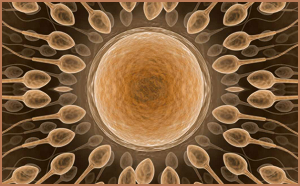Ayurveda defines 12 factors contributing to the quality of baby’s development. Visualize if you can, how nutrition and lifestyle can influence all these 12 factors:
1) Paternal influence
2) Maternal influence
3) Soul/ past life karmas (aatmaja)
4) Agni – Tejas (physical and mental digestive strength)
5) Soma – Ojas quality (immunity strength)
6) Vayu – Prana (vitality — life force strength)
7) The 3 mental Gunas – Sattva, Rajas & Tamas and their influence on mood and character
8) The 5 senses (strength of vision, hearing, smell, touch and taste)
9) The Mind – (stability and strength of focus)
10) The Buddhi (intellect or intelligence)
11) Smruti (memory and ability to retain and recall)
12) the 5 elements (the quantity of earth, water, fire, air and ether in a person’s constitution)
 In a nutshell, shukra (sperm) and artava (egg) contain the maternal & paternal elements of heredity. These include components of the: 5 elements, 20 qualities of nature, 3 mental gunas (SRT), three doshas (VPK), 7 dhatus (tissues), and refined essence of the three doshas (ojas, tejas and prana–OTP), all of which shape the embryo and are known as “basic units of hereditary.”
In a nutshell, shukra (sperm) and artava (egg) contain the maternal & paternal elements of heredity. These include components of the: 5 elements, 20 qualities of nature, 3 mental gunas (SRT), three doshas (VPK), 7 dhatus (tissues), and refined essence of the three doshas (ojas, tejas and prana–OTP), all of which shape the embryo and are known as “basic units of hereditary.”
Within the first 2 weeks of pregnancy, the placenta is working, giving oxygen and life force to the baby. The prana taken in by the mother must be refined and delicate, not intense or jarring. Rasa dhatu (plasma) should be sattvic for this intricate process which means it needs to be clear of ama (toxins) or anything that may obstruct the tiny but critical developments. Pitta toxins and kapha phlegm both morning sickness which blocks the flow of prana. The invisible work of mothers in pregnancy is to provide a supportive harmonious energy field and nourishment for her developing baby’s body and blueprint. Proper nutrition of mind and body (the 12 factors) are what create this environment.
